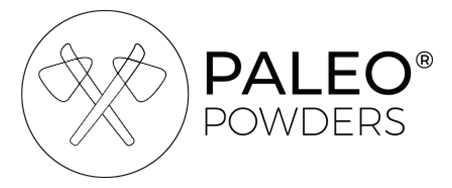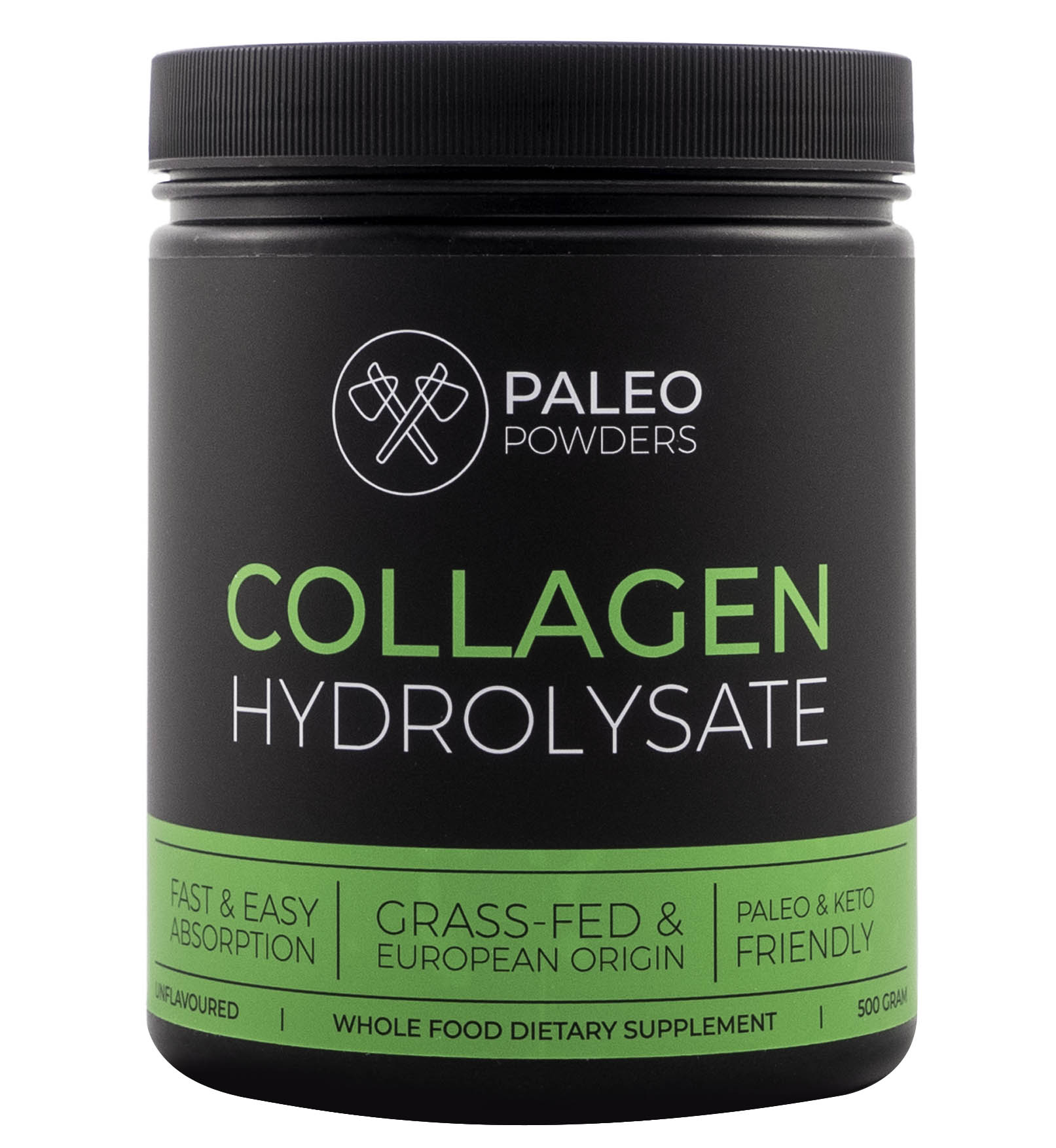
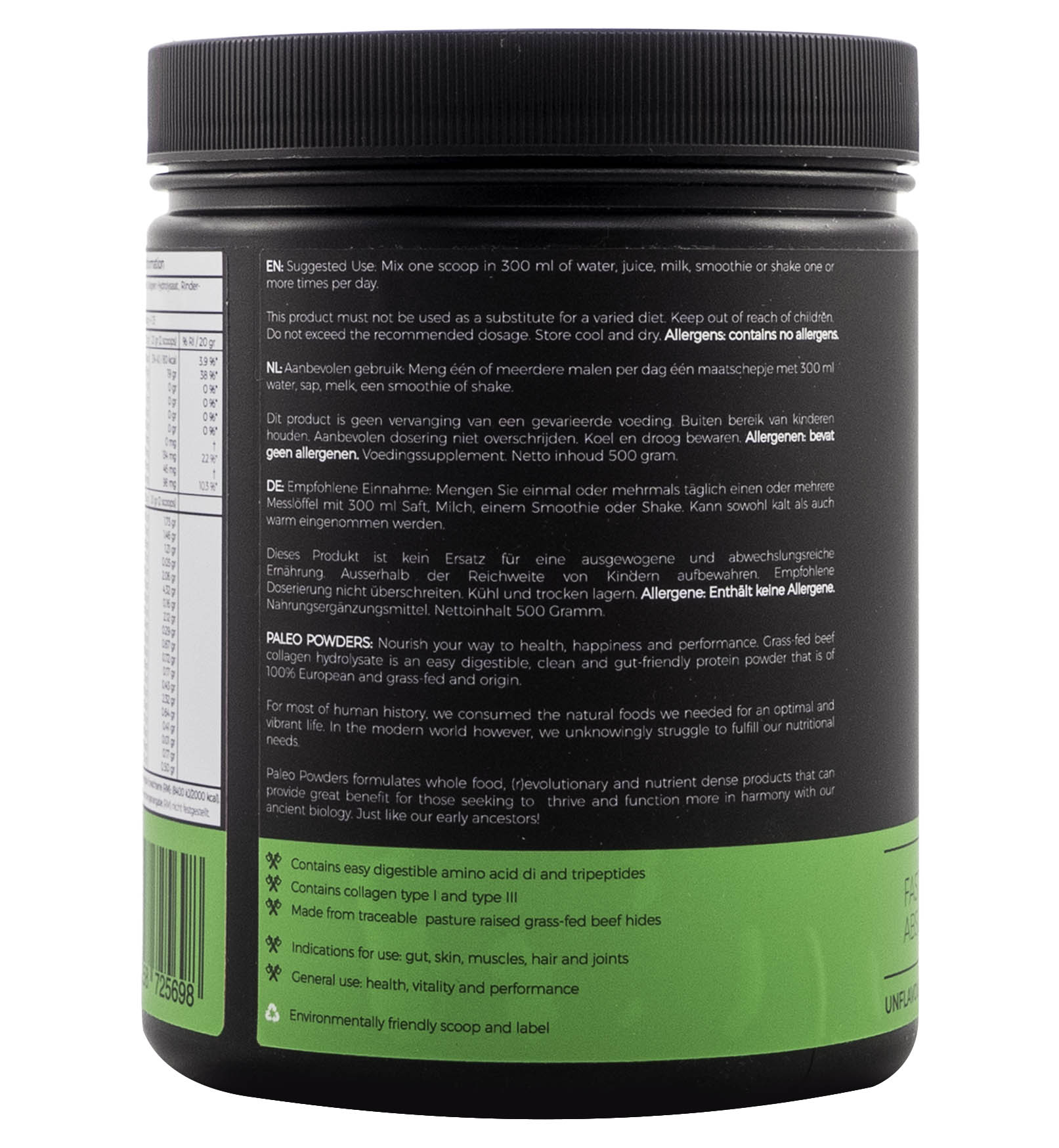
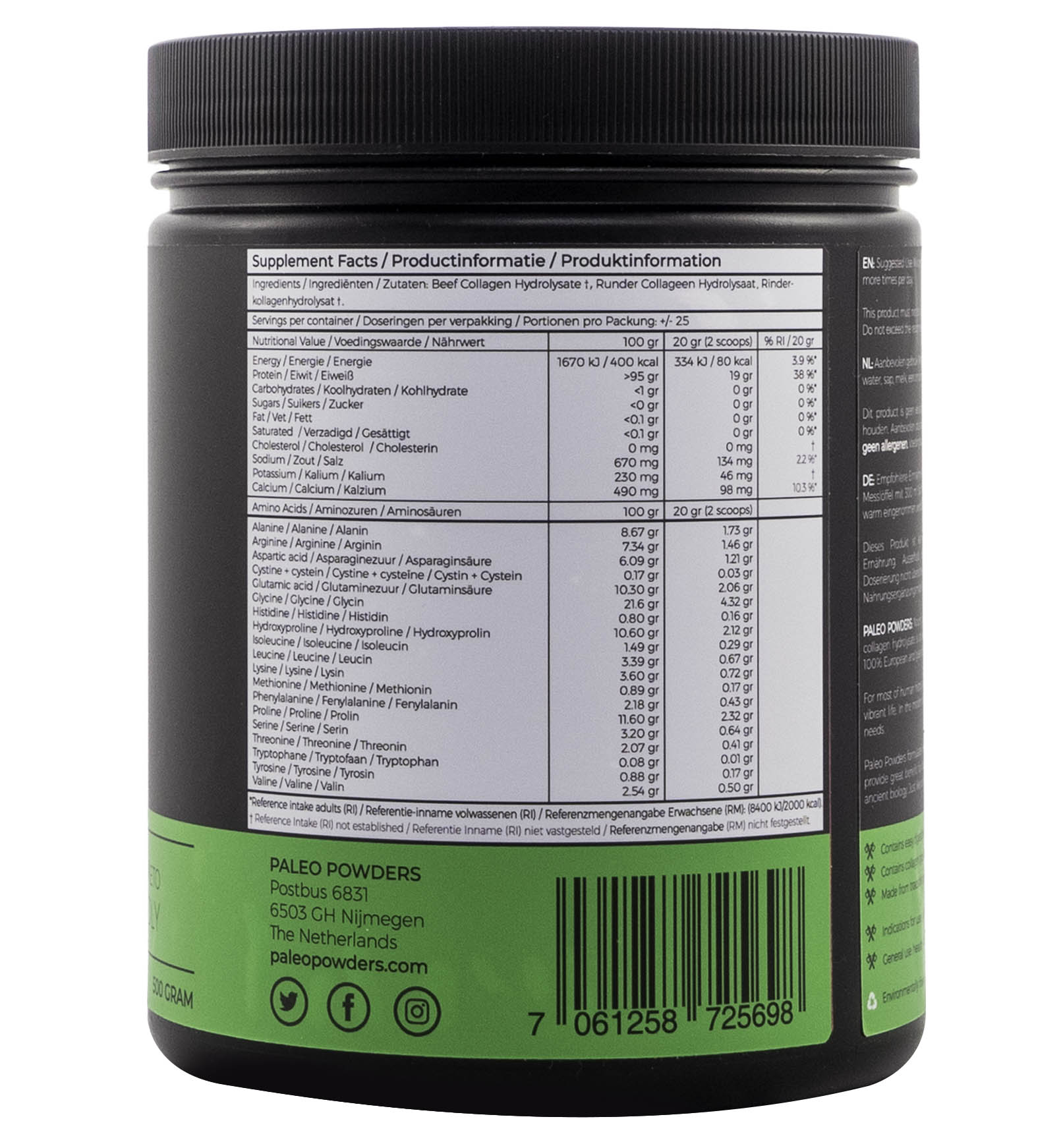
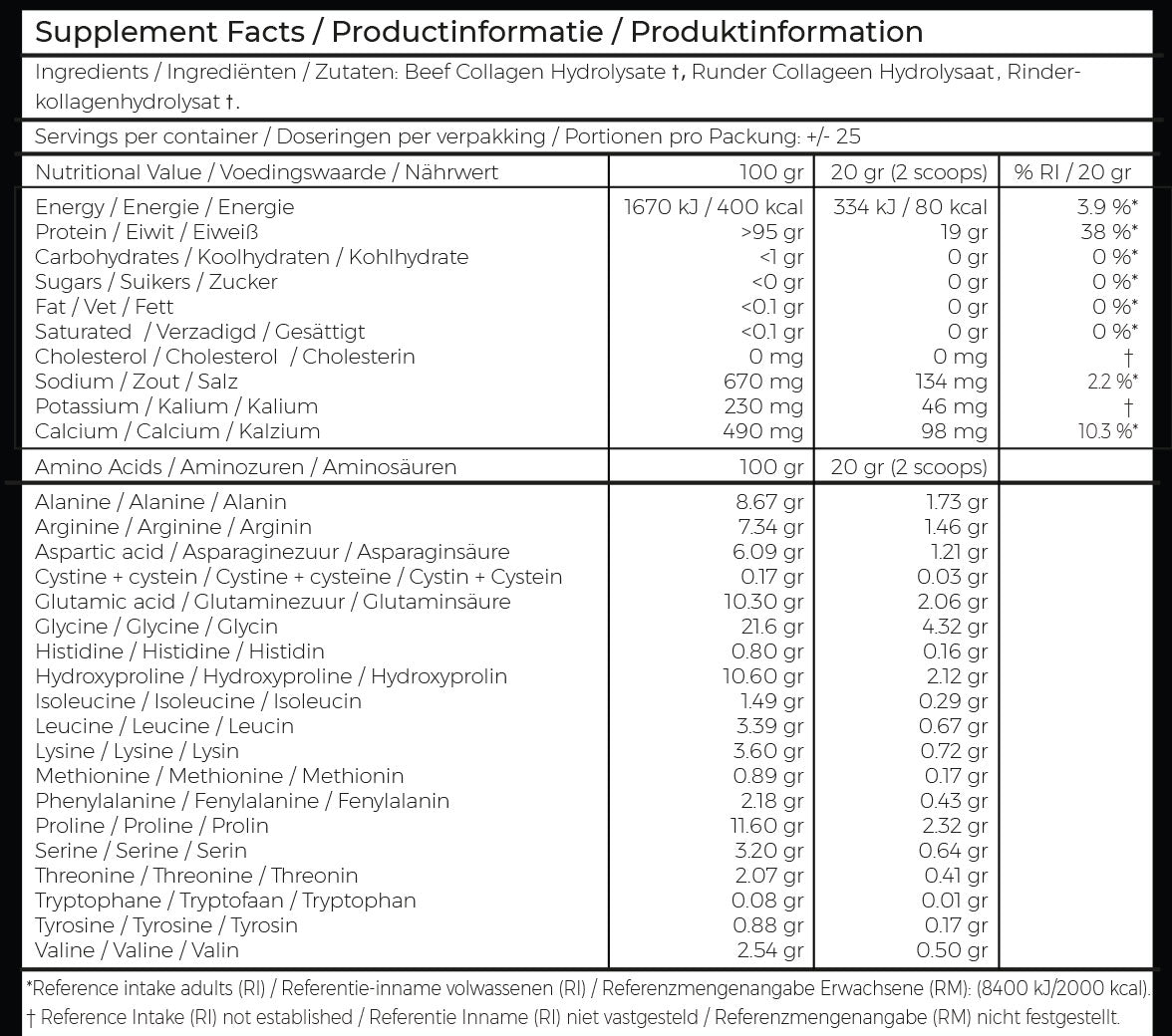

Collagen Hydrolysate - Grass-Fed - 500 grams
Collagen Hydrolysate is the ultimate nutricosmetic supplement for your skin, hair and nails! More than 70% of the proteins in your skin consist of collagen. But collagen is not limited to the outside of the body.
Collagen Hydrolysate is found almost everywhere in the body. It is also the "cellular glue" that helps hold all the connective tissue in your body together. Collagen provides the structure for your bones, muscles, tendons, articular cartilage, hair and internal organs, including the entire digestive system.
The versatile role of collagen hydrolysate
Collagen not only plays a crucial role in your appearance, how you feel and ultimately how well your body functions in general, but it is most abundant in the skin, bones, tendons and ligaments. It holds all our tissues together and provides the skeleton with a firm but flexible structure. Collagen that you consume through food or supplements increases your body's own collagen supply.
Maintaining good levels and an adequate daily intake of collagen is an interesting part of the nourishing diet that the body has evolved to expect.
Benefits of Collagen Hydrolysate:
- Neutral taste and dissolves quickly
- Contains important amino acids such as glycine, proline and hydroxyproline
- Suitable for a keto diet: contains 0 grams of sugar
- Contains collagen types I and III
- More than 95% protein per serving
- Sourced from Europe, with guaranteed quality
- Exclusively from grass-fed pasture cattle
- Contains 500 grams per jar
Why do you need collagen?
- Just like all other tissues in your body such as muscles, bones and even your brain, the collagen in your body has input from the environment and nutrition for its function and quality.
- By the time you're 40, your body's ability to produce its own collagen drops by about 25%. At age 60, your production is well above half of youthful levels. Contrary to wisdom, time is not on your side when it comes to collagen. By taking collagen you support the body's own collagen network
- Collagen is needed to bring balance to the modern diet. Nowadays, almost only lean muscle meat is eaten. Lean muscle meat is high in the amino acid l-methionine, and very low in the amino acid glycine. With Collagen the opposite is the case; low in L-Methionine and high in Glycine.
Upgrade yourself from within with Collagen Hydrolysate
You can increase your collagen intake in various ways, for example by consuming bone broth, stews and tougher meat cuts. You can also use a high-quality collagen hydrolysate powder from grass-fed pasture cattle. The latter option is a very convenient and practical way to supplement your diet with this nutritious and unique composition of important amino acids. By taking collagen you support the body's own collagen network.
Glycine, lysine & (hydroxy)proline
Collagen does not contain all the essential amino acids, making it an incomplete protein. But the amino acids it contains are particularly important, especially glycine. Other important amino acids are glutamine, lysine, (hydroxy)proline. The amino acid profile of collagen is significantly different from the amino acid profile of lean meat: these profiles are truly complementary to each other and actually balance each other out. Most likely exactly as nature intended! Unlike collagen, muscle meat contains high levels of L-methionine and low levels of glycine. A good balance between these two amino acids appears to be of particular importance for health and longevity.
Paleo and keto approved
Collagen hydrolysate is made with paleo-approved ingredients from paleo-responsible sources. It also fits perfectly into a ketogenic diet because collagen hydrolysate contains 0 grams of sugars. With the acclaimed nutritional value of grass-fed European cattle, the powder is not only nutritious but also convenient to use. Maintaining your own collagen networks has never been easier in a paleo responsible way. Collagen hydrolysate is also easily digestible and quickly absorbed.
100% European origin
Collagen peptides are made from grass-fed European pasture cows. During the winter months the cows are housed indoors. Fortunately, here they still receive natural and nutritious grasses in the form of silage (fermented grass) or hay. Additional feed concentrates are used as little as possible and only when really necessary to maintain optimal animal health. Responsibly sourcing our collagen in Europe increases sustainability. Paleo Powders collagen is the best choice in terms of quality, sustainability and environmental philosophy! In contrast to intensive bio-industry collagen or collagen from America or Asia.
Made from nutritious bones
Our collagen is made from high-quality beef bones, which are hydrolyzed naturally and gently by enzymes. This gives the peptides a low molecular weight of 3-6 kDa. The taste is very neutral, making it an ideal ingredient for shakes, smoothies and even recipes. Due to the low molecular weight, the collagen peptides are absorbed effectively and quickly. With more than 95% protein per serving, this nutritional supplement is as pure and high-quality as it can be.
Quality is important
Collagen powders are not all of the same quality. In 2020, the Clean Label Project analyzed 30 collagen products for the heavy metals arsenic, cadmium, lead and mercury. The report showed that 100% of collagen supplements tested had mercury levels within safe food standards. However, 34% did contain low measurable concentrations. However, 37% tested positive for high concentrations of lead and 17% tested positive for high concentrations of cadmium.
Animal-friendly and sustainable purchasing solves many of these problems. The said report emphasizes that heavy metal contamination is a by-product of concentrated animal feeding and animal processing. Fortunately, we only choose European grass-fed and pasture-grazing sources for our collagen hydrolysate. Another factor that contributes to heavy metal pollution, according to the report, is air pollution. This is unfortunately a fact of the modern world, but can be solved with the right processing technologies.
Tested for heavy metals
Quality control, product safety and transparency are very important to us. That is why we thoroughly screen each analysis certificate and all new batches are analyzed twice in an independent laboratory. This way we ensure quality! The typical values of heavy metals in our collagen hydrolysate:
- Arsenic (As) < 0.10 mg/kg = < 0.1 PPM
- Cadmium (Cd) < 0.01 mg/kg = < 0.01 PPM
- Lead (Pb) < 0.05 mg/kg = < 0.05 PPM
- Mercury (Hg) < 0.005 mg/kg = < 0.005 PPM
Difference Collagen, Bone Broth & Kefir
|
Collagen Hydrolysate |
Bone Broth |
Kefir Whey |
|
Neutral taste |
Mildly savory |
Creamy |
|
Fast absorption |
Normal absorption |
Fast absorption |
|
Hydrolyzed |
Not hydrolysed |
Semi hydrolyzed |
|
Collagen types I & III |
Collagen types I to 5 |
No collagen |
|
Enzymatic |
Pulled slowly |
Kefir fermented |
|
95% proteins |
98% proteins |
90% proteins |
|
95% collagen |
78-84% collagen |
0% collagen |
|
No dairy |
No dairy |
Dairy whey |
|
0% fat |
2-5% fat |
0% fat |
|
0% sugars |
0% sugars |
0% sugars |
|
Glycine 21.6% |
Glycine 20% |
Glycine 1.5% |
|
BCAAs 7.42% |
BCAAs 8.4% |
BCAAs 23.75% |
|
Hydroxyproline 10.6% |
Hydroxyproline 10.2% |
Hydroxyproline 0% |
|
From bones |
Fleshy bones |
Meadow milk |
|
No glucosamine |
Contains glucosamine |
No glucosamine |
| No chondroitin | Contains chondroitin | No chondroitin |
| No hyaluronic acid | Contains hyaluronic acid | No hyaluronic acid |
Primal background
Our ancestors from the hunter-gatherer era, and even many generations afterward, ate much more collagen than we do today. This was due to their heavy dependence on animal food. They always ate the animal from nose to tail, meaning they consumed the entire animal. Including skin, tendons and other gelatinous parts. Sea animals or land animals or a combination of both: eating from nose to tail was the norm!
Migration: eating more carnivore
It is known that when hunter-gatherers moved north from the equator, they could eat fewer plants. The colder it got, the fewer plants grew naturally. Since plant foods decrease significantly with increasing latitude, this was compensated with animal foods. Prehistoric hunter-gatherer groups generally obtained about 50% of their diet from animal sources. Modern hunter-gatherer societies obtain approximately 60% of their nutrition from animal sources.
Nose-to-tail concept
In prehistoric times, eating only lean muscle meat, without the fats, organs, glands and collagen tissues, would not have been enough to thrive, or even survive. A significant portion of animal food sources would provide nutrient-rich and collagen-rich tissues. In the modern world we generally eat mainly lean muscle meat. We gave up nose-to-tail eating decades ago. Collagen-rich meat or tough meat or other animal parts are no longer preferred today over leaner and more tender meat.
The difference between historical and modern daily collagen consumption is therefore striking. Vegetarians and vegans tend to consume even less collagen than they already do. Based on a paleo perspective, which promotes the nose-to-tail eating concept, it is important to eat enough collagen.
Fascinating collagen dynamics
Collagen maintenance and quality depend not only on an adequate daily diet but also on mechanical stress on the body such as sports and exercise. Collagen can quickly change its crystallinity in response to physical forces. For example, the crystallinity and arrangement of collagen molecules in the cartilage in your knees changes with every step you take. Due to the changing mechanical load on each knee during a step, the structural state of the collagen shifts back and forth. The statement "Use it or lose it" applies not only to muscles and bones, but also to collagen tissue. If you do not provide your tissues with the right stimuli, they will lose quality and functionality! Frequent and diverse exercise is part of our human heritage. Fortunately, it's an integral part of a paleo lifestyle.
Synergy between collagen & water
Water is another important Paleolithic factor relevant to your collagen. After water, collagen is the most abundant substance in your body. In a natural state, collagen contains 60% of its weight from water. Water is therefore an integral part of collagen. Water molecules can adhere tightly to collagen and follow the helix shape neatly and orderly. The complex dynamics of water molecules in hydrated collagen tissue play an important role in determining its structural and functional properties. In other words; good hydration is important for your collagen. Therefore, take good care of the functioning of your mitochondria and drink plenty of pure water every day. Along with exercise and diet, this should be at the top of everyone's list when it comes to collagen health and function.
Hierarchy of health factors
Of course, sleep, earthing, and sensible sunlight exposure are also critical factors that support healthy collagen levels and collagen function throughout the body. Sleep provides a longer period of recovery, while sunlight provides red and near-infrared light, especially around dawn and dusk. Earthing, contact with bare feet on the earth, supplies the connective tissue matrix with electrons from the earth.
The most common protein
Did you know that there are many types of “most common” proteins in nature? For example, collagen is the most abundant protein in the animal kingdom. There are at least 16 types of collagen, but 80-90% of the collagen in the body is types I, II and III. Actin is the most abundant protein in most eukaryotic cells. It is highly conserved and participates in more protein-protein interactions than any other known protein. These properties make actin a critical player in many cellular functions. In the plant kingdom we find RuBisCO (ribulose-1,5-bisphosphate carboxylase oxygenase). It is considered the most abundant protein in the world because it is present in every plant that undergoes photosynthesis and molecular synthesis during the Calvin cycle. It has been calculated that rubisco constitutes 20-25% of the soluble protein in leaves. It is produced at a rate of about 1000 kg/s on Earth.
Summary Collagen Hydrolysate
Collagen Hydrolysate is therefore not only a supplement for your appearance, but also for the inner system. More than 70% of the proteins in your skin consist of collagen, but the effect does not stop at the surface! Collagen is found throughout your body, acting as a kind of "cellular glue" that holds connective tissue together and provides a strong structure to bones, muscles, tendons, articular cartilage, and even your digestive system.
In addition, Bovine Collagen Hydrolysate is an excellent alternative to fish collagen, for example, especially for those with allergies. With the benefits of Collagen Hydrolysate, including important amino acids, a high protein content, and easy digestibility, collagen is a supplement for every day and for basically everyone!
Inhoud
Instructions
INGREDIENTS
Choose options





